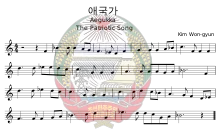Aegukka
"Aegukka" (Chosŏn'gŭl: 애국가; lit. 'Song of Patriotism'), officially translated as "Patriotic Song",[2] is the national anthem of the Democratic People's Republic of Korea, more commonly known as North Korea. It was composed in 1945 as a patriotic song celebrating independence from Japanese occupation and was adopted as the state anthem in 1947.
| English: Patriotic Song | |
|---|---|
| 애국가 | |
 Sheet music atop North Korean state emblem | |
National anthem of North Korea | |
| Also known as | (English: Song of a Devotion to a Country) |
| Lyrics | Pak Se-yong, 1946[1] |
| Music | Kim Won-gyun, 1945[1] |
| Adopted | 1947 |
| Audio sample | |
Instrumental recording
| |
Similar to "Auferstanden aus Ruinen", the former national anthem of the former German Democratic Republic, more commonly known as the former East Germany, being banned in the Federal Republic of Germany, particularly having been banned in the former West Germany and still being banned in the reunified Germany, performance of this anthem is strictly prohibited in the Republic of Korea, more commonly known as South Korea, under the National Security Act.
Etymology
"Aegukka" is a Romanized transliteration of "The Patriotic Song"; the song is also known by its incipit Ach'imŭn pinnara or "Let Morning Shine"[1][3] or in its Korean name 아침은 빛나라 or alternatively as the "Song of a Devotion to a Country".
The Encyclopedia of Korean Culture defines "Aegukka" as "the song to wake up the mind to love the country". "Aegukka" in itself is differentiated from a national anthem. While a national anthem or gukka (lit. 'country song') is an official symbol of the state, aegukka refers to any song, official or unofficial, that contains patriotic fervor towards its country, such as Hungary's "Szózat" or the U.S. "The Stars and Stripes Forever". However, the nationally designated "Aegukka" plays the role of symbolizing the country.[4][5] In general shorthand, the term aegukka refers to the national anthem of North Korea.[4]
History
| Aegukka | |
| Chosŏn'gŭl | |
|---|---|
| Hancha | |
| Revised Romanization | Aegukga |
| McCune–Reischauer | Aegukka |
Originally, the Korean exile government (1919–1945) in Shanghai, China adopted as their national anthem "Aegukga" (which has the same name with a different Romanization) to the tune of "Auld Lang Syne". After World War II, South Korea kept the words, put to a new tune (changed from "Auld Lang Syne"), while North Korea adopted this newly written piece in 1947.[3] The words were written by Pak Se-yong and the music was composed by Kim Won-gyun.[1]
In the early 1980s, Kim Jong-il sought to reduce the song's importance to the benefit of "Song of General Kim Il-sung".[7]
The complete version of "Aegukka" consists two verses. On official occasions, when only the first verse is performed, it is customary to repeat the last four bars. However, if both verses are performed, it is the last four bars of the second verse that are repeated instead.[8][9] "Song of General Kim Il-sung" and "Song of General Kim Jong-il" have since taken the place of de facto national anthems domestically, and "Aegukka" is reserved for representing North Korea internationally: when foreign dignitaries visit the country or North Korean athletes compete at international sporting competitions.[10] "Aegukka" is almost unique among most North Korean patriotic songs, as it praises neither the Workers' Party of Korea nor the Kim dynasty, but rather the whole of Korea itself. "Aegukka" is played at the start of each of Korean Central Television's broadcast days.[11][12]
Lyrics
| Chosŏn'gŭl[13] | Hanja | McCune–Reischauer romanization | English translation from Kim Il-Sung University[14] |
|---|---|---|---|
I |
I |
I |
I |
See also
Notes
References
- Hoare, James E. (13 July 2012). Historical Dictionary of Democratic People's Republic of Korea. Scarecrow Press. p. 273. ISBN 9780810879874. Retrieved 10 April 2017.
- "National Anthem of the DPRK". DPRK Today. Archived from the original on 12 February 2018. Retrieved 27 July 2018.
- Agency, Central Intelligence (1 January 2015). "KOREA, NORTH". The World Factbook. Masterlab. ISBN 9788379912131.
- "애국가". Academy of Korean Studies. Retrieved 8 October 2013.
- "애국가[愛國歌]". Doosan Corporation. Retrieved 8 October 2013.
- Eddie Burdick (26 May 2010). Three Days in the Hermit Kingdom: An American Visits North Korea. McFarland. p. 248. ISBN 978-0-7864-5653-6. Retrieved 25 April 2015.
- BlueMarbleNations (27 October 2011). "North Korean National Anthem – "Aegukka" (KO/EN)". Archived from the original on 12 December 2021 – via YouTube.
- Military Parade Music (4 September 2015). "Military Music – North Korean National Anthem – "Aegukka"". Archived from the original on 12 December 2021 – via YouTube.
- Lankov, Andrei (24 April 2007). North of the DMZ: Essays on Daily Life in North Korea. McFarland. p. 38. ISBN 978-0-7864-5141-8. Retrieved 31 August 2016.
- Archived at Ghostarchive and the Wayback Machine: "National Anthem of North Korea – Hymne National de la Corée du Nord [New HD Broadcast – Dec. 2017]". YouTube.
- Archived at Ghostarchive and the Wayback Machine: "KCTV startup 23-04-2020". YouTube.
- "조선민주주의인민공화국의 상징". 조선의 오늘. Retrieved 3 July 2021.
- "Kim Il Sung University". Archived from the original on 7 December 2020.
Further reading
- Kim Il-sung (1980) [1946]. "To Create the National Anthem and the March of the People's Army: Talk with Writers" (PDF). Kim Il Sung: Works. Vol. 2. Pyongyang: Foreign Languages Publishing House. pp. 406–409. OCLC 827642144.
External links
- Lyrics in English at Naenara
- Lyrics in Korean at Naenara
- Lyrics in English at Kim Il-Sung University
- "Aegukka" (mp3) at Naenara